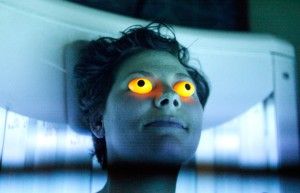Spring break preparation could put students at risk

March 8, 2012
Tanning and dieting could be stereotyped as commonly practiced activites leading up to spring break.
Each activity is known to pose both long- and short-term health risks, especially if practiced in extremes.
“Any behavior that’s done in any sort of extreme is probably going to have detriments to some aspect of a student’s health,” said Christy Hamilton, wellness coordinator at Student Health Services.
Advertisement
The four main areas that seem to present the most problems in the time around spring break are tanning, dieting, binge-drinking and sexual activities, she said.
Hamilton said students who engage in risky activities should consider implementing risk-reduction behaviors as well as practicing moderation.
During the last two weeks before spring break, Paradise Island Tanning Salon sees increased customers and sales, said Megan Kendrick, a salon employee.
Kendrick said the most common reason is so students can get a base tan and won’t have to deal with the pain of sunburn during their trip.
Skin cancer is unfortunately an increasing phenomenon across the country, especially with young people, Hamilton said. She said extreme tanning and tanning-bed availability are two contributing factors to the cancer statistic increase.
Extreme dieting and exercise are not usually for health reasons when pursued in a short time frame, she said. Often with these efforts, students are trying to obtain a beach-ready body and forfeit their healthy habits, she said.
Advertisement*
“These efforts are rarely maintained upon return from break, especially considering the drinking habits many students practice,” Hamilton said.
She said with binge drinking, weight gain is prevalent because of the amount of alcohol students consume, which shocks their bodies and introduces an excess calorie intake.
Aside from reversing pre-break efforts, students can put themselves at risk by appearing vulnerable to criminals in tourist areas, she said.
“It’s important for students to be aware that if they don’t practice moderation, they can increase their risk of being targets for theft and being taken advantage of,” Hamilton said.
Misha Bond, a junior from Crete studying elementary education, said she has been tanning for the past three weeks, working out twice a day and picking up extra work shifts at work to prepare for a trip to Panama City Beach, Fla.
She said although there are extremes, the consequences can be minimal as long as students don’t abuse their bodies.
Bond said even though there are many risks in party areas such as Panama City Beach, it’s worth the memories and getaway.
“Our group plans to stay safe by sticking together and traveling with a group of guys and girls,” she said. “It is going to be a drunk week, so we do have to keep our heads on straight.”
Hamilton said students should be mindful about wrapping up their semester once they return from break.
It’s important to remember that the choices made over break can impact the remainder of a student’s semester and education, she said.
The Student Health Center offers many services such as counseling, seminars and professional medical advice, in the event that students return with dire circumstances, she said.
She said students should speak up and share their concerns with their friends.
“Overall, one of the greatest safety mechanisms besides practicing self-responsibility is to watch out for each other,” Hamilton said.
Advertisement








